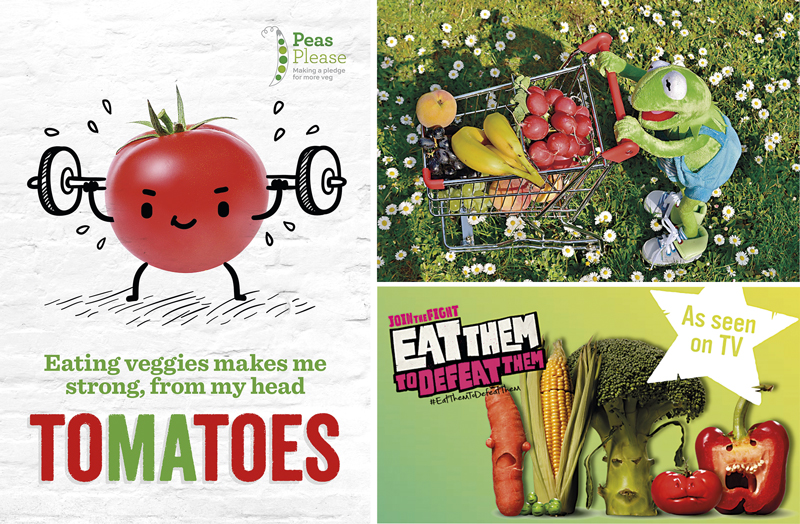Disentangling nutrition facts from fiction
Towards healthy and sustainable consumption in industrialized societies

Over the last centuries, in the context of industrialization, globalization, and urbanization, profound dietary changes have occurred. Ubiquitous access to cheap, readily available and highly palatable unhealthy products, together with aggressive marketing that significantly influences social norms, have led to overconsumption of energy-dense, nutrient-poor foods. This has not only been associated with a higher prevalence of obesity and diet-related non-communicable diseases, but also with detrimental effects on the world’s natural resources. Broader and braver public health measures favoring the availability and affordability of healthy, minimally processed foods should be implemented in conjunction with educational strategies to re-encourage a healthy and sustainable food consumption.
Keywords: nutrition transition, ultraprocessed food, non-communicable diseases, environmental sustainability, public health strategies.
The nutrition transition
Over the last centuries, urbanization and globalization have rapidly changed the food supply and distribution systems, and consumer preferences and purchases have heavily shifted towards less nutritious, more convenient high-calorie food products. To date, the consumption of unhealthy foods has outpaced the consumption of healthy foods in most regions of the world (Imamura et al., 2015).
«Nowadays many diets are low in fruits, vegetables, whole grains, nuts, seeds and legumes, and increasingly high in ultra-processed products»
Nowadays many diets tend to be low in whole foods such as fruits, vegetables, whole grains, nuts, seeds, and legumes, and increasingly high in ultra-processed products, such as sugar-sweetened beverages, processed meats, dairy products with added sugar, and pastries, which contain a high amount of salt, refined sugars, unhealthy fats, and additives (Monteiro et al., 2013). In fact, according to the Global Nutrition Report (2018), 86 % of diets do not align with the healthy diet recommendations promoted by the World Health Organization (WHO).

Worldwide sugar consumption has tripled over the past 50 years, and this increase is expected to continue, particularly in emerging economies. The picture shows that an eight-year-old child in Spain has already eaten more sugar than its grandfather throughout a lifetime. / sinAzucar.org
These dietary shifts have been associated with a higher prevalence of overweight and obesity and diet-related non-communicable diseases (NCDs), such as cardiovascular disease, diabetes, and cancer. Simultaneously, many people are malnourished and cannot access or afford a healthy diet due to various underlying social determinants, including poverty. In the current global context, modern dietary trends also have detrimental effects on the world’s natural resources: land availability, biodiversity, and overall ecosystems.
The increased availability of unhealthy food has been driven by economic and political influences within an industrialized food system that intensively produces and markets nutrient-poor – yet very profitable – foods. Such foods have a high content of energy and are engineered to be extremely palatable, thereby driving overconsumption.
These factors, together with cultural norms such as consumerism, hedonism, and materialism, have modified eating habits so that more people eat away from home, overconsume food, and spend less time cooking. Consequently, the traditional dietary patterns of Southern-European countries such as Spain, that in the 1950s and 1960s adhered to Mediterranean diet (high in legumes, fruits, vegetables, fish, nuts, and olive oil, and low in meat, dairy, and ultra-processed products), have now lost their essence of frugality, replacing their eating habits with a more westernized diet.
«Unhealthy food is available practically everywhere, cheap to buy, and heavily marketed, influencing what we think of as a normal eating pattern»
Nevertheless, many cultural and social differences still exist between the United States and Southern-European countries regarding unique features of the food environment (Díez et al., 2019). Preserving the diversity of the Mediterranean urban food environments is not only linked to adopting healthier dietary patterns but also beneficial social behaviors. As recognized in 2010 by UNESCO, the Mediterranean diet is an intangible cultural heritage due to both nutritional and encompassing cultural aspects (Bach-Faig et al., 2011).
Environmental, cultural and social factors

These days, most consumers no longer buy local and seasonal foods, but rather buy in large stores containing a wide variety of ready-to-eat products. We are gradually losing the Mediterranean food culture. / Kevin Phillips / Pixabay
Globally, traditional stores are in decline while supermarkets are becoming dominant due to their competitive prices and wider choices, which results in an increased availability of cheaper, overly processed, poor-quality foods which, together with cultural deprivation and failure to achieve proper human flourishing (VanderWeele et al., 2019), have led to overconsumption of energy-dense, nutrient-poor foods. At the same time, intensive marketing efforts and established social norms have continuously increase their demand.
Advertising plays a key role in driving us towards an increased consumption of unhealthy foods. Unfortunately, food companies can afford to spend much more resources on junk food advertising compared to what the government spends on promoting healthy eating. A revealing analysis showed that companies producing the top 18 UK brands commonly associated with crisps, pastries, and sugary drinks spent more than 160 million euros on advertising their products in 2016, which was around 27.5 times the annual spending on the government’s healthy eating campaign Change4Life run by Public Health England (O’Dowd, 2017).
Given this situation, several initiatives have been undertaken in the UK to both promote advertising of fruits and vegetables and restrict junk food advertising. In Spain, a self-regulation code for food advertising aimed at children, known as the PAOS code, was implemented in 2005 and updated in 2012 in order to prevent obesity and encourage healthy habits. However, it has repeatedly been shown to be ineffective and should therefore be replaced by public health measures that can effectively protect children from the marketing of unhealthy foods and beverages.
Contextual factors that are poorly aligned with moderate and healthy eating may as well undermine the commonly accepted concept of eating in moderation. Nowadays, it is possible to choose from thousands of different discretionary or unhealthy foods and portion sizes are increasingly big, so it is not sufficient to advise eating «everything in moderation». In fact, currently available evidence does not seem to support the notion of eating «a varied diet» or «everything in moderation» as an effective strategy to promote healthy eating patterns nor a healthy body weight (De Oliveira Otto et al., 2018). Dietary guidelines are sometimes insufficiently clear on this point, as they use euphemisms («moderating» instead of «reducing» or «avoiding») and provide no quantitative guidance on the maximum recommended frequency of consumption of occasional or discretional foods (e.g., processed meats, pastries, salty snacks, and sugar-sweetened beverages).
Particularly dangerous is the tendency in guidelines to use crystal clear terminology when it comes to promoting an increased consumption of healthy foods, whereas the terminology is not so clear when referring to less healthy foods that should be avoided. In the latter case, guidelines tend to focus on nutrients (sugar, salt, fat) rather than foods (red and processed meats, sugar-sweetened beverages, sugary cereals, pastries, salty snacks, etc.), using an opaque, «politically correct» language that implies a net harm for the health of the population (Domínguez et al., 2018). Ambiguous terminology of this kind is known to be further harnessed by some sectors of the food industry who take advantage of it by lobbying against sensible regulations (i.e., tax sugary beverages) and by using misleading marketing strategies. In contrast, food-based dietary advice is simpler to implement and prevents food corporations from strategically exploiting the reductive focus on nutrients to market unhealthy foods using nutrient content claims.

Botanical diversity and synergy among healthy foods play a key role in the preventive potential of diets. In this sense, we must assess overall food patterns instead of single nutrients or foods. / Pixabay
It has been suggested that the «nutrient-centered» approach has not only led to confusion among the general public, but also to falsely accusing specific nutrients. The real issue is not so much about nutrients, but more about foods, which are much more than the sum of their nutrients and calories. Two foods with the same nutritional composition may have a different health potential, especially regarding the satiety effect and nutrient bioavailability. The dietary patterns approach used in epidemiologic studies since the beginning of this century is more comprehensive and has proved to be more coherent than the single nutrient approach, because it accounts for food synergies. While single nutrient approaches have proved to be inadequate to explain many effects of diet on NCDs, modifications in several aspects of the dietary pattern can indeed impact the development of a disease. An illustrative example is the beneficial role of the Mediterranean dietary pattern in cardiovascular health, as the landmark Spanish trial PREDIMED (prevention with a Mediterranean diet) and many high-quality studies have thoroughly demonstrated (Martínez-González et al., 2019).
Public health nutrition independence at risk
Suboptimal diets are responsible for more deaths and disability worldwide than any other modifiable factor (Global Burden Disease 2017 Diet Collaborators, 2019). However there are limited resources available for research about the health effects of foods. In this landscape, the food industry inevitably plays a major role by supporting nutrition research. Yet, there is no evidence for an alignment of public health nutrition interest with that of the food industry. Any partnership must create profit for the industry, which has a legal mandate to maximize wealth for shareholders.
«Suboptimal diets are responsible for more deaths and disability worldwide than any other modifiable factor»
Concerns have been raised regarding the presence of bias in the design, conduct and dissemination of industry-funded research, possibly skewing findings toward industry financial profits. These concerns have been confirmed, for example, in a study evaluating systematic reviews on the association between sugar-sweetened beverages and weight gain, in which the authors concluded that studies with industry sponsorship were five times more likely not to show an association compared with those funded by non-industry sponsors (Bes-Rastrollo et al., 2013). Food industry sponsorship can also have an important effect on how scientific questions are formulated and tested, driving research agendas away from questions that are the most relevant for public health. Another review found that food industry-sponsored research typically focuses on single nutrients rather than dietary patterns, allowing companies to market ultra-processed products containing certain nutrients as beneficial to health (Fabbri et al., 2018).
Additionally, findings from investigative journalism have shown that sponsorship of public health research from an American multinational corporation of sugar sweetened beverages resulted in the reshaping of the obesity research agenda to focus on physical activity rather than nutrition, thereby downplaying the role of sugar-sweetened beverages in obesity (O’Connor, 2015, August 9). More recently, a study examined the research partnerships between the same beverage company and health organizations in Spain, providing further evidence that some of the food industry biggest players are reframing the debate about the causes of obesity and skewing the evidence towards solutions that protect their financial interests (Rey-López & Gonzalez, 2019).
This influence on research may allow the food industry to narrowly frame public health problems and policy solutions as lacking willpower and needing self-regulation efforts or technological interventions rather than behavioral or system-wide interventions. In fact, key recommended regulatory policies to promote healthy eating remain unimplemented to date, largely due to the private sector interests dominating public policy development. Therefore, strategies to counteract corporate influence on the research agenda are urgently needed, including expansion of disclosure policies, increased funding for public research, and better guidelines to regulate the interaction of research institutes with commercial entities.
Similar strategies across different industries
It has been suggested that some transnational corporations can be considered major drivers of NCD epidemics because they profit from increased consumption of tobacco, alcohol, and ultra-processed foods. These industries use similar strategies in order to undermine effective public health policies and avoid regulation through both «hard power» (i.e., building financial and institutional relations) and «soft power» (i.e., influence of culture and ideas) (Moodie et al., 2013). For example, the use of agnogenic practices (i.e., the production of scientific research that deliberately creates ignorance or doubt beyond that merited by empirical evidence) to favor industrial interests has been described on several occasions.

The alcohol, tobacco, sweetened beverages, and ultra-processed food industries use similar strategies to undermine public health policy and avoid strict regulations. / Ponce Photography, Pixabay / Michael Gaida, Pixabay / Gerd Altmann, Pixabay
Corporate agnogenesis exploits the inherent skepticism in scientific research, under the rationale that creating uncertainty around available scientific evidence makes it less useful for public health actions. This challenges the development and implementation of evidence-based policies aimed at managing the market environment for unhealthful commodities. As an executive from a tobacco company stated: «Doubt is our product, since it is the best means of competing with the body of fact that exists in the mind of the general public» (Oreskes & Conway, 2010, p. 34). The tobacco industry perpetuated doubt about the health hazards of their products calling into question the reliability and accuracy of unfriendly scientific results, and introducing scientific «noise» into the public discourse. This became the leading tactic to oppose the science connecting smoking to lung cancer. The same mechanisms have been similarly employed in three other cases: global warming, pharmaceuticals, and sugar-sweetened beverages (Fooks et al., 2019; Pinto, 2017).
Did we fail somewhere or is there truly still a lack of knowledge?
Prevention would have been the best solution. Public health professionals could have anticipated the current situation acting over upstream determinants, including cultural, social, and economic aspects that configure our society. The alarming rise of NCDs is a manifestation of a cultural and economic system that currently prioritizes wealth over health or human flourishing, meaning that many key problems and solutions actually lie outside the health sector. Nevertheless, clinicians are the ones who have done an outstanding job in this case, since major chronic diseases and health risks associated with poor-quality diet have not been prevented, but have been mitigated over the past few decades by an increasingly powerful and expensive array of treatments.
There is a widespread misconception, mainly due to perverse agnogenic practices, that nutrition is hard and confusing, that we do not really know what to eat and that health professionals cannot agree. However, it is a fact that there is a consistent and convincing high-quality body of knowledge about the effects of food patterns on health that is commonly accepted by the mainstream scientific community. This knowledge is sufficiently adequate for supporting a generalized adoption of plant-forward food patterns emphasizing fruits, vegetables, whole grains, nuts, legumes, olive oil, fish, and bird meat and minimizing red meat, processed meat, refined grains and ultra-processed foods (Willett et al., 2019).

Promoting and advertising can be powerful tools for the greater good by persuading children to eat their greens. On the left and at the bottom, posters for one of the campaigns by The Food Foundation in the UK, aimed at children. On the top right corner, Kermit the Frog, a popular muppet character, next to a cart full of fruit and vegetables. / The Food Foundation / Alexas, Pixabay / The Food Foundation
It is therefore surprising that one of the latest initiatives taken by the Spanish Government in 2018 was to reach voluntary and self-regulating agreements in order to promote a 5 % reduction in the content of sugar, salt, and saturated fat in pastries, sweets, sugary cereals, and other discretionary products. It is not only highly probable that this initiative will not be effective (as previously experienced with other self-regulation measures), but it may also be counterproductive because it could give the impression that those kind of products will be healthier after reformulation. In light of recent findings showing that energy intake and body weight increases are driven not only by the unbalanced nutrient profile of ultra-processed food, but also by other yet unknown factors that lead to overconsumption of this kind of foods, a focus on nutritional reformulation of critical nutrients may not necessarily be effective.
Broader, braver and more radical public health measures favoring the availability and affordability of healthy, minimally processed foods (fiscal measures, advertising regulations, plain packaging norms, school junk-food restrictions, and sustainable agricultural policies, among others) should be established to create an environment that helps consumers make the healthy choice. Educational strategies are also needed to strengthen the role of parents and family bonds in order to target permissiveness, hedonistic attitudes and overconsumption of unhealthy foods since childhood (Martínez-González & Martín-Calvo, 2019).
The food system drivers of unhealthy diets, especially the production and aggressive marketing of resource-intensive foods, are also key drivers of malnutrition, ecosystems degradation, and climate change. In fact, food production is one of the largest causes of global environmental change. It is responsible for 30 % of green-house gas emissions, 40 % of land use, and 70 % of freshwater use (Willett et al., 2019). Thus, plant-based diets are not only among the healthiest dietary patterns, but also have the lowest environmental impact. This means that what is good for our health is also good for the planet and, consequently, for the future of humanity. Importantly, linking diet-related diseases with other major global challenges focuses attention on the scale and urgency of addressing these challenges and might increase demand for policy action by the public (Swinburn et al., 2019).
References Bach-Faig, A., Berry, E., Lairon, D., Reguant, J. Trichopoulou, A., Dernini, S., … Serra-Majem, L. (2011). Mediterranean diet pyramid today. Science and cultural updates. Public Health Nutrition, 14(12), 2274–2284. https://doi.org/10.1017/S1368980011002515 Bes-Rastrollo, M., Schulze, M. B., Ruiz-Canela, M., & Martínez-González, M. A. (2013). Financial conflicts of interest and reporting bias regarding the association between sugar-sweetened beverages and weight gain: a systematic review of systematic reviews. PLoS Medicine, 10(12), e1001578. https://doi.org/10.1371/journal.pmed.1001578 De Oliveira Otto, M. C., Anderson, C. A. M., Dearborn, J. L., Ferranti, E. P., Mozaffarian, D., Rao, G., Wylie-Rosett, J., & Lichtenstein, A. H. (2018). Dietary diversity: Implications for obesity prevention in adult populations: A science advisory from the American Heart Association. Circulation, 138(11), e160–e168. https://doi.org/10.1161/CIR.0000000000000595 Díez, J., Bilal, U., & Franco, M. (2019). Unique features of the Mediterranean food environment: Implications for the prevention of chronic diseases Rh: Mediterranean food environments. European Journal of Clinical Nutrition, 72, 71–75. https://doi.org/10.1038/s41430-018-0311-y Domínguez, L. J., Bes-Rastrollo, M., Basterra-Gortari, F. J., Gea, A., Barbagallo, M., & Martínez-González, M. A. (2018). Should we recommend reductions in saturated fat intake or in red/processed meat consumption? The SUN prospective cohort study. Clinical Nutrition, 37(4), 1389–1398. https://doi.org/10.1016/j.clnu.2017.06.013 Fabbri, A., Lai, A., Grundy, Q., & Bero, L. A. (2018). The influence of industry sponsorship on the research agenda: A scoping review. American Journal of Public Health, 108(11), e9–e16. https://doi.org/10.2105/AJPH.2018.304677 Fooks, G. J., Williams, S., Box, G., & Sacks, G. (2019). Corporations’ use and misuse of evidence to influence health policy: A case study of sugar-sweetened beverage taxation. Globalization and Health, 15(1), 56. https://doi.org/10.1186/s12992-019-0495-5 Global Burden Disease 2017 Diet Collaborators. (2019). Health effects of dietary risks in 195 countries, 1990–2017: a systematic analysis for the Global Burden of Disease Study 2017. The Lancet, 393(10184), 1958–1972. https://doi.org/10.1016/S0140-6736(19)30041-8 Global Nutrition Report. (2018). Shining a light to spur action on nutrition. Development Initiatives. https://globalnutritionreport.org/reports/global-nutrition-report-2018/ Imamura, F., Micha, R., Khatibzadeh, S., Fahimi, S., Shi, P., Powles, J., Mozaffarian, D. (2015). Dietary quality among men and women in 187 countries in 1990 and 2010: A systematic assessment. Lancet Global Health, 3(3), e132–e142. https://doi.org/10.1016/S2214-109X(14)70381-X Martínez-González, M. A., Gea, A., & Ruiz-Canela, M. (2019). The Mediterranean diet and cardiovascular health. Circulation Research, 124(5), 779–798. https://doi.org/10.1161/CIRCRESAHA.118.313348 Martínez-González, M. A., & Martín-Calvo, N. (2019). Ultraprocessed Foods and Public Health: A Need for Education. Mayo Clinic Proceedings, 94(11), 2156–2157. https://doi.org/10.1016/j.mayocp.2019.09.021 Moodie, R., Stuckler, D., Monteiro, C., Sheron, N., Neal, B., Thamarangsi, T., Lincoln, P., Caswell, S., & Lancet NCD Action Group. (2013). Profits and pandemics: prevention of harmful effects of tobacco, alcohol and ultra-processed food and drink industries. The Lancet, 381(9867), 670–679. https://doi.org/10.1016/S0140-6736(12)62089-3 Monteiro, C. A., Moubarac, J. C., Cannon, G., Ng, S.W., & Popkin, B. (2013). Ultraprocessed products are becoming dominant in the global food system. Obesity Reviews, 14, 21–28. https://doi.org/10.1111/obr.12107 O’Connor, A. (2015, August 9). Coca-Cola funds scientists who shift blame for obesity away from bad diets. The New York Times. O’Dowd, A. (2017). Spending on junk food advertising is nearly 30 times what government spends on promoting healthy eating. British Medical Journal, 359, j4677. https://doi.org/10.1136/bmj.j4677 Oreskes, N., & Conway, E. M. (2010). Merchants of doubt. Bloomsbury Press. Pinto, M. F. (2017). To know or better not to: Agnotology and the social construction of ignorance in commercially driven research. Science & Technology Studies, 30, 53–72. https://doi.org/10.23987/sts.61030 Rey-López, J. P., & Gonzalez, C. A. (2019). Research partnerships between Coca-Cola and health organizations in Spain. European Journal of Public Health, 29(5), 810–815. https://doi.org/10.1093/eurpub/cky175 Swinburn, B. A., Kraak, V. I., Allender, S., Atkins, V. J., Baker, P. I., Bogard, J. R., … Dietz, W. H. (2019). The global syndemic of obesity, undernutrition, and climate change: The Lancet commission report. The Lancet, 393(10173), 791–846. https://doi.org/10.1016/S0140-6736(18)32822-8 VanderWeele, T. J., McNeely, E., & Koh, H. K. (2019). Reimaging health-flourishing. JAMA, 7(17), 1667–1668. https://doi.org/10.1001/jama.2019.3035 Willett, W., Rockström, J., Loken, B., Springmann, M., Lang, T., Vermeulen, S., Garnett, T., Tilman, D., DeClerck, F., Wood, A., Jonell, M., Clark, M., Gordon, L. J., Fanzo, J., Hawkes, C., Zurayk, R., Rivera, J. A., De Vries, W., Majele Sibanda, L., … Murray, C. J. L. (2019). Food in the anthropocene: The EAT-Lancet commission on healthy diets from sustainable food systems. The Lancet, 393(10170), 447–492. https://doi.org/10.1016/S0140-6736(18)31788-4





